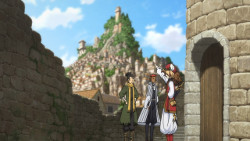 |
 |
 |
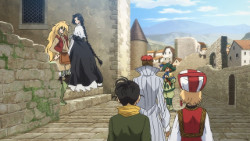 |
 |
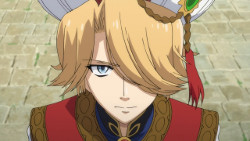 |
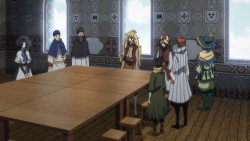 |
 |
 |
 |
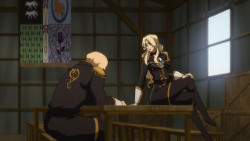 |
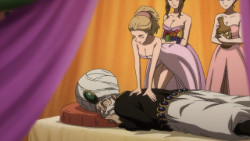 |
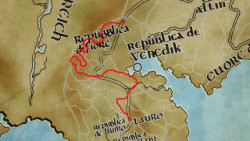 |
 |
 |
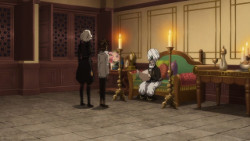 |
 |
 |
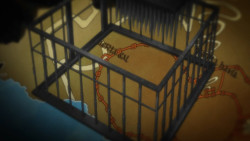 |
 |
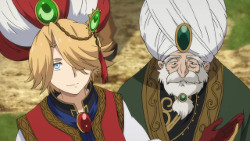 |
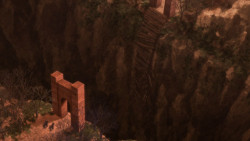 |
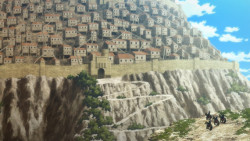 |
 |
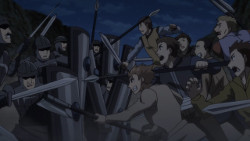 |
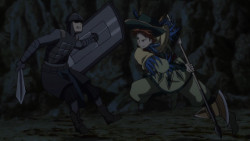 |
 |
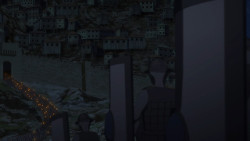 |
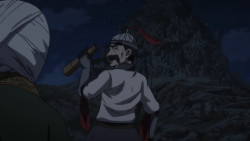 |
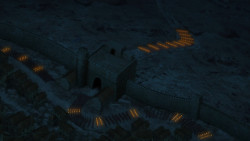 |
 |
 |
 |
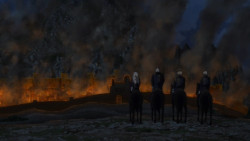 |
 |
 |
「楽園の檻」 (Rakuen no Ori)
“The Cage of Paradise”
When all is said and done and Altair finally reaches its conclusion, there’s no doubt in my mind that this show will have set the bar for geopolitics in anime. Altair is certainly cruising through its material and has a penchant for rapid fire character introduction and development, but the ideas it espouses and the themes presented make for some wonderfully meaty material. Case in point being this week, where ideals are tuned to meet the circumstances.
I’m surprised it took this long for a character like Mahmut to appear, but it is a fitting spot to introduce one, especially one who seriously prods at Mahmut’s morality. Carvajal, besides looking like Mahmut in 20 years, possesses a similar mindset in seeking peaceful existence and doing what is right for the people. He wishes no harm on anyone…and yet immolates over ten thousand souls with no hesitation. It’s a viciously ingenious scene, showing how violence and pacifism can coexist and work towards similar goals. Stories and real life often see peaceful idealism as a virtue to uphold against all (and many stories often feature struggles to reconcile such belief with countering circumstances), but Altair questions the need to always uphold it. If the enemy is unwilling to follow the rules, what obligation do you have to do the same? It may feel good obeying the principles taken as ultimate good, but how well will they serve if you are dead? This is a dilemma with a different response from everyone, for every individual alone will know at what point personal morality must be set aside in favour of other objectives. Mahmut has previously indicated his willingness to do what is necessary to save his country, but Carvajal is the first real test of that resolve. Can Mahmut, if required, kill unremorsefully to see his dream reached, or is that one step too many? It’s a question he must answer soon, for quite a few lives are resting on his choice.
Where Altair will likely start seriously playing this dilemma up, however, is in matters to come. For example we have already seen the technology angle before with the muskets, but Halil Pasha’s blunt rejection of another wonder weapon (and the designer’s retention of a blueprint copy) suggest Altair is just getting started in this theme. Whatever the device is (likely cannons or explosives given the mention of using it for reconstruction), if it can slaughter armies and exterminate towns, someone will eventually use it in that capacity (*cough* Balt-Rhein), and when that happens, there’s no putting the genie back in the lamp. As Balt-Rhein has repeatedly shown, this war is a matter of state survival, and Balt-Rhein (at minimum) places no limits on the pursuit of that goal, no matter the consequences. Halil Pasha’s moral stance may be commendable, but I fear he is only setting himself up for one hell of a fall against an enemy caring little about honour. With Balt-Rhein not only numerically outmatching the alliance forces, but also willing to do anything for victory, I don’t think it will take long before Turkiye’s first expeditionary force is sent home in pieces, and very likely without its general.
Something tells me Mahmut’s personal struggles (and discovering the true reach of this war) are only just beginning.
Preview
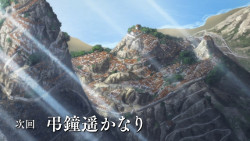 |

I’ve not read the source material but thinking from a story teller’s perspective, Mahmut can’t be the savior unless Halil pasha fails. So yes, I think he’s going to pay dearly for rejecting new tech on the basis of “the goal of war is not to kill a lot of people”. It’s a stupid and idealistic thing to say for a supposedly experienced general.
It depends on the era really. While more common during, say, the 16-1800s, many generals have held similar beliefs as Halil Pasha over the years. Even Germany had several during WW2 who tried hard to maintain their ideals in the face of utter insanity. Halil’s choice will likely get him killed, but letting go of personal morals is often difficult for even the most philosophically pliant of individuals.
ironically historical golden-age Turkey used tech innovation freely, with mercenary cannons (whose service were rejected by the last Byzantine emperor, no less) bringing down the walls of Constantinople – and using numerous engineers and artillery later on to supplement the vaunted Jenisseri infantry
Ironical, isn’t it? Shoukoku no Altair seems willing to play real historical situations but also change the protagonists. In fact, Halil Pasha’s rejection of a new military technology, much to the desginer’s chagrin, sounds suspiciously similar to the case you mentioned:
https://en.wikipedia.org/wiki/Orban
Orban was a bombard engineer who first offered his services to the Byzantines. When Constantine XI didn’t hire him, he went straight to the Ottomans, who were more than pleased to give him the resources he needed to create the superguns they would later use against the walls of Constantinople. So I wouldn’t be surprised if this anime “Orban” does the same and goes to Balt-Rhein instead.
to add some more historical examples, Anthony Fokker initially offered his design for machinegun mechanism allowing shooting thru rotating propeller to Entente in WW1, was rebuffed and then turned to Germans
both Columbus and later Magellan were sent away by Portugal and Sapin welcomed them with money, men and ships (which kickstarted Spanish naval ascendancy and colonial empire)
That doesn’t make sense. He wants to get revenge against Balt-Rhein.
As sealouse mentions, I don’t think the kid will be running over to Balt-Rhein just to see his design being used after they burned down his town and everyone in it. Might happen if Balt-Rhein winds up capturing the kid and his design (which I think will likely happen), but I could just as easily see someone else in Turkiye deciding the weapon makes perfect sense given the circumstances. Turkiye is not a monolith, there will be some who think the end justifies the means.
Regarding the cannons:
Show Spoiler ▼
https://randomc.net/image/Shoukoku%20no%20Altair/Shoukoku%20no%20Altair%20-%2019%20-%20Large%2015.jpg
Here comes diversity.
Prepare to be culturally enriched.
historical Ottoman empire had holdings and vassal states in Africa…
But this is an fantasy World not an History Documentation
@Worldwidedepp
Thank you for clearing that up, captain obvious.
I like how they really thought of logistics throughout the episode. From the pain of marching through an indirect route, to maintaining and disrupting supplies.
Speaking of supplies, I wonder how things will pan out here. Taking in thousands of refugees means adding pressure on your resources. At least the 6000 man army nearby seem to be self sufficient, but it does add a time limit of sorts. Then there’s the fact that they just got rid of 10000 enemy troops, which also means 10000 less mouths to feed. Waiting it out certainly doesn’t look like a good idea. Safe to say there will be a few skirmishes next week.